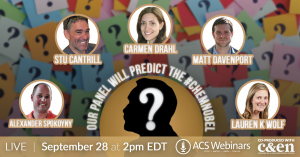In the near future, a few of the world’s most influential minds will experience one of the most exciting reasons to get a phone call from Sweden: this year’s Nobel prizes will be announced October 3rd through October 10th.
Immediately following, their marketing and communications directors will be scrambling – with a plan, or without one.
“I was at home—it was about 5:30am—and I started getting texts from the president of the university,” said Kira Poplowski, vice president for communications and marketing at Drew University. Drew Fellow William Campbell had just won a share of the 2015 Nobel Prize in Physiology or Medicine.
So what if this was you? How do science marketers like Kira respond to major awards like the Nobel? Here are three takeaways from those who have done it well.
1. Unprepared? Manage mass attention by starting small.
Drew University is a liberal arts institution based in Madison, N.J. with about 2,000 undergraduates. It had zero Nobels under its belt, which in terms of marketing a win, turned out be both a gift and a (temporary) curse: “Unlike some research universities, we were not paying attention,” Poplowski said.
So she immediately assembled her team. She issued a statement from the president on the train into work and asked her team to find a good photo of Campbell, preferably one of him with a student. She knew her first priority needed to be posting information for the media. Then, while emails and phone calls poured in, she started on a news article for the breaking story.
The lesson here is that when your organization is not expecting such massive recognition, rely on smaller communications efforts to know what your marcom team can cover, how fast you can post new content, and what multimedia is at your disposal to cut legwork and delays from managing sudden media attention. If your company, institute or scientist has potential to win, consider alerting writers and photographers in advance.
TIP: Set up Google Alerts for your institution or specific scientist in the weeks leading up to the Nobel announcement.
 Our very own C&EN is co-hosting a Chemistry Nobel predictions webinar which can be a resource to educate yourself on the landscape. So while it’s very hard to know for sure, there can be signs before the announcement goes out.
Our very own C&EN is co-hosting a Chemistry Nobel predictions webinar which can be a resource to educate yourself on the landscape. So while it’s very hard to know for sure, there can be signs before the announcement goes out.
2. The award is not your message. The award elevates your message.
Drew University’s marketing messaging is built around mentorship and hands-on learning opportunities, whereas Campbell received his award for developing treatments for parasitic diseases. Instead of changing its message, Drew created content around Campbell’s mentoring experience in the RISE program, which pairs retired industrial scientists with undergraduate researchers (Campbell conducted his award-winning research at Merck). Something as simple as using a picture of Campbell with a student for official communications about the award is incredibly on point with their message.
The university’s audience also cares about long-term outcomes, so Poplowski’s team followed up with Campbell’s former students, and wrote about their careers.
An industry example of elevating a message through an award comes from Leica Microsystems and the 2014 Nobel Prizes. The Chemistry prize was awarded to a group that discovered super-resolution microscopy, which Leica had since commercialized. The announcement was quickly featured on an existing content hub, Science Lab, and Leica interviewed one of the Laureates, posting the video alongside articles, graphics and other videos about the technology and the award.
Remember that you strengthen your brand when you present consistent messaging. No exceptions, not even for a Nobel Prize. Rather, tying your award into your existing communications shows the relevance of your message. While award-granting institutions present an honor in one light, it’s your unique spin that will make the award meaningful to your audience.
3. Embrace the entire sales funnel
In addition to bolstering your existing media plan with relevant publications, leverage major recognition to reach the broadest possible audience. If there was one time to spend money on New York Times advertising, Poplowski said, this was it.
Because an award can also attract attention from a general interest audience. Take a tip from the Nobel Foundation, whose interviews include plenty of content that, for instance, reveal a Laureate’s personality, and nearly always asks: “Where were you when you got the call?” For science prizes, the Nobel Foundation prepares both technical and non-technical briefings to explain the awards, and that’s a technique you can learn from.
Drew’s marketing response followed Campbell from his visit to the White House in November, to his acceptance speech in Stockholm in December and beyond. The university hosted a campus celebration, a private dinner in his honor and awarded him an honorary degree in May. Banners were hoisted up in high-traffic spots on campus while the news traveled by newsletter, the alumni magazine, undergraduate recruiting materials and sponsored Twitter and Facebook posts.
In sum: Scale your marketing plan to the situation.
The general interest nature of awards draws a wide audience and creates an opportunity to build awareness, so build into your campaign communications tailored to audiences that don’t know you or your science.
Did it pay off?
Poplowski thinks it did. The effort garnered:
• More than 5,000 media hits
• 3x the industry-average click-through rate on their New York Times digital ads
• 15 percent more applications, including twice as many early decision applications
Although she can’t prove a direct cause-and-effect relationship, the award marketing plan was clearly created a brand lift. This year, Poplowski said she isn’t expecting another Nobel, but she is going to be prepared anyway. Be aware, she recommends. Regardless of how likely a major award may be, know when awards are coming, who in your organization could win, and what your capabilities are to promote them. The results may surprise you.


















